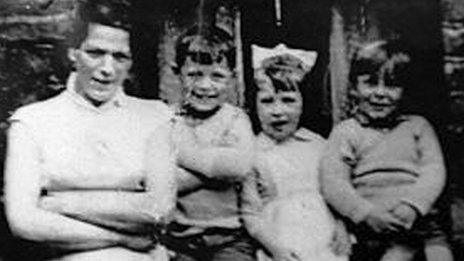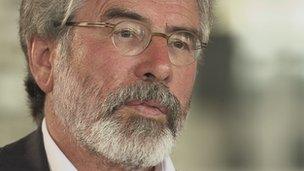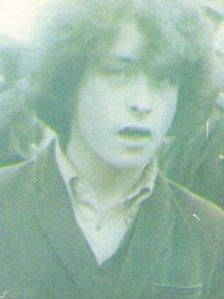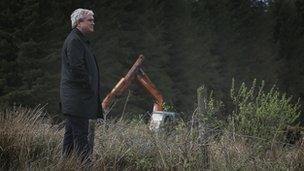The Disappeared: Hidden story of Northern Ireland Troubles
- Published

Widow Jean McConville left behind 10 children when she was abducted and murdered
"Can you imagine being a little boy and watching men and women come and take your mother?"
These words open a chilling new documentary telling the hidden story of the Disappeared; at least 15 people who were murdered and buried in secret graves by the IRA during Northern Ireland's Troubles.
Some of their bodies have never been found.
Presenter Darragh MacIntyre hears the previously untold stories of many of the relatives left to grieve for decades while never quite knowing the fate of their loved ones.
The voice of Seamus Heaney reading his poem, the Bog Queen, can be heard at the start and end of the programme over stark footage of the vast marshlands in various parts of the Republic of Ireland where the bodies are believed to lie within.
One family that did finally receive closure was that of Jean McConville, a widow and mother-of-10 who was dragged from her home in west Belfast. Her body was recovered in 2003 on a beach in County Louth in the Republic of Ireland.

Gerry Adams denies he was involved in Jean McConville's disappearance
Her daughter Agnes gives her first broadcast interview since her mother's remains were discovered.
In one poignant moment, her interview is intercut with footage of her as a child just weeks after her mother's disappearance where she says: "We'll keep our fingers crossed and pray for her to come back."
While the dramatic story initially attracted the attention of the media in the weeks around Christmas 1972, republicans sent out the message that she was merely "in hiding" because of the publicity; headlines like "Missing mother reported to be back in Belfast" began emerging.
Agnes McConville said she and her siblings were hearing a different story
"Children growing up around Divis flats would hear what their parents were saying. Your mummy's a tout, she's this and that, your mummy will never be back, she's gone with a British soldier - this wasn't coming from the adults, it was coming from the children," she said.
Within months the children were split up in various care homes across Northern Ireland.
Sinn Féin president Gerry Adams is repeatedly pressed in the documentary about allegations he was involved in the disappearance of Mrs McConville - allegations he repeatedly rejects.

This photograph of Kevin McKee was taken on the day he disappeared
Documentary maker Alison Millar said when she saw the moving footage from 1972 of the McConville children talking about their mother, she had been determined to track down Agnes.
"She had never seen the famous clip, and she just kept saying 'they could have killed me, I said all that as a child, where did I get the strength from?'"
She said the access they got to the families involved a period of building up a rapport.
"We started meeting families 18 months ago and we didn't start filming until early this year," she said.
"A lot of my work is from that tradition of film-making where most of your time is tea and biscuits, and the last bit is where you work it all out.
"The relationships were built up by both myself and Darragh by just talking to people."
This intimacy has led to moving encounters with several relatives of the Disappeared who have previously not been in the spotlight.
'Tough viewing'
The programme also hears the story of the priest who gave the last rites to Eamon Molloy before he was executed. His body was found at an old cemetery between the border and Dundalk, County Louth, in 1999.

Presenter Darragh MacIntyre visits the scene of a dig for remains
Phil Smyth shows a photograph she took of her 17-year-old nephew Kevin McKee on the day he went missing. The youngest of all the Disappeared, his body has never been found.
Alison Millar said it was "tough viewing" for the families who were given a preview of the documentary.
"It's very raw still and while maybe they were fine watching their own story, when they saw something like Kathleen Armstrong talking to her husband Charlie at his grave, they were deeply moved," she said.
Darragh MacIntyre said the use of Seamus Heaney's poetry was "unconventional but adds a lot to the film".
"I sent him a fax to get permission as that was the way you'd communicate with him - I explained the exact context of how we wanted to use it.
"We got a note back saying he was delighted and that he felt the poem was suitable to be used in this way."
He says that while the film examines a dark chapter in Northern Ireland's past, the Independent Commission for the Location of Victims Remains, external - which co-ordinates searches and obtains information in confidentiality - is hopeful that it may result in fresh leads.
"This is a current story - seven people are still missing, and four of them are probably within 40 minutes of Dublin city centre, in bogs in County Meath," he said.
The Disappeared was first shown on Monday 4 November on BBC One Northern Ireland. It is broadcast again at 22:00 GMT on Tuesday 5 November on BBC Four, and is available to watch on iPlayer.
A series of additional clips are available on the programme's website.